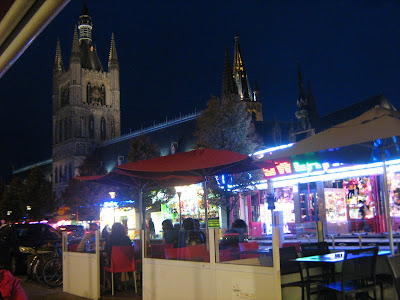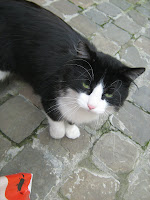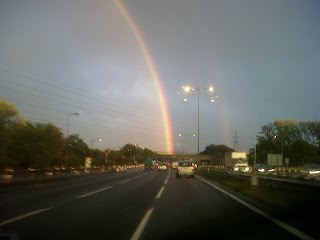Thursday, September 29, 2011
I have a great idea...
Sunday, September 25, 2011
Stuck

see more dog and puppy pictures
Last week I got stuck in a scene.
It's not a thing that happens very often, which is good because it's frustrating. I'm not the world's fastest writer, but I do like to end the day with some sense of accomplishment, and that's hard to do when I'm constantly writing the same page—and sometimes the same sentence—over and over and over, deleting the whole thing and starting again...
 What happened last week wasn't writer's block. I was still writing. It just wasn't getting me anywhere. It felt like I'd driven out onto the ice with the wrong sort of tires and was sitting there spinning my wheels.
What happened last week wasn't writer's block. I was still writing. It just wasn't getting me anywhere. It felt like I'd driven out onto the ice with the wrong sort of tires and was sitting there spinning my wheels.Stubbornness kept me from jumping ahead to a new scene that might have been easier, partly because I don't like admitting defeat and partly because I knew it was only a matter of finding the right words, the right phrase, the right bit of dialogue...finding that one patch of grit that would give my wheels traction.
 Experience has taught me the important thing for me to do is keep the car in drive. It's only by sitting there day after day at the keyboard and typing that I come unstuck, even if in the meantime I have to create and delete several pages of story.
Experience has taught me the important thing for me to do is keep the car in drive. It's only by sitting there day after day at the keyboard and typing that I come unstuck, even if in the meantime I have to create and delete several pages of story.Most of the time my subconscious is simply not happy with how I'm approaching the scene, or it's busily working on some other problem (I rather suspect that, most times, it's the latter, since when I get stuck I invariably end up getting lots of new ideas for a scene that happens later...) (sigh).
It's good to know the effort isn't wasted.
 But I still confess I felt relieved when yesterday I finally wrote a sentence that felt right, and then another, and the whole entire story seemed to shift and creak and start to roll ahead again.
But I still confess I felt relieved when yesterday I finally wrote a sentence that felt right, and then another, and the whole entire story seemed to shift and creak and start to roll ahead again.I'm curious to know if any other writers here get stuck, and if so, how they deal with it? And readers, have you ever come across a point in any book where you believe the writer got bogged down? I always wonder, as a writer, if those spinning wheels leave marks behind...
Come back Thursday, to read Julie's next post.
Thursday, September 22, 2011
The RNA ROCKS!!
Sunday, September 18, 2011
Turning Points
So what had me thinking about these things was not the current book or even the one I'm editing but yesterday. Yesterday I took my eldest to university. As my husband and I drove back in sun and rain and times watching the most amazing cloudscapes and rainbows I had ever seen...we had just experienced a major turning point - ours and his. Yes, he would still come home and want to be fed and so on, but it would be different. Holidays will no longer be planned around us, decisions made would be about his life and not our family. Life from this point forward will be from his point of view based solely on his needs until another big turning point happens in his life...
Yesterday really put turning points in a story into focus...life goes on but differently. From my point of view as a mother I have to let go....from his everything is possible....
Come back on Thursday to see what Biddy has to say.
Monday, September 12, 2011
Being Bossy
 Have I told you already that I’m a Leo? Probably. And although not everyone believes in horoscopes, an awful lot of the basic character traits associated with each star sign seem to fit most people. With me, it’s the Leo “leader” trait, combined with a slight Virgo tendency to want everything to be neat and tidy. I say slight, because it only surfaces occasionally, but I blame that on the fact that I’m born three days away from the Leo/Virgo border and who wants to be a Domestic Goddess anyway? My cupboards certainly don't look like the one in the photo below!
Have I told you already that I’m a Leo? Probably. And although not everyone believes in horoscopes, an awful lot of the basic character traits associated with each star sign seem to fit most people. With me, it’s the Leo “leader” trait, combined with a slight Virgo tendency to want everything to be neat and tidy. I say slight, because it only surfaces occasionally, but I blame that on the fact that I’m born three days away from the Leo/Virgo border and who wants to be a Domestic Goddess anyway? My cupboards certainly don't look like the one in the photo below!
Anyway, I don’t mean I aspire to being prime minister or anything like that, but I do like to organise things, people and events. Being bossy, others might call it (and frequently do!) – my best friend, who I’ve known since I was five, always complains that I bossed her around when we were kids. I maintain she should have stood up for herself and not let me, but that’s another story ... The fact is, I enjoy any kind of organising!
Take the school PTA for instance. When my daughters were in junior school, I wanted to get involved because it seemed like a great way of being part of their school world. I quickly found out that not many other parents felt this way and that if the PTA members wanted anything done, it was a lot faster to do it yourself than to ask anyone to help. I did a two-year stint as chairman with very little thanks (except from the school staff, who appreciate all the help they can get) and a lot of hard slog. Even so, I enjoyed it immensely. (And yes, I know things are different in the States and Canada – the PTA seems to be a lot more important over there.)
Now my girls hav e grown up and left school, and I have moved on to a much nicer committee – that of the Romantic Novelists’ Association. I’ve been on it for more than four years now and I’ve loved every minute. As we all know, being an author can be lonely, so it’s great fun to be a part of the running of an organisation such as the RNA. You get to meet some lovely people, help make decisions that affect us all and best of all (for me) I get to organise things, like awards and events! (Right now, I'm helping to put together a Regency Day, which Julie and Biddy will take part in as well, which is great.)
e grown up and left school, and I have moved on to a much nicer committee – that of the Romantic Novelists’ Association. I’ve been on it for more than four years now and I’ve loved every minute. As we all know, being an author can be lonely, so it’s great fun to be a part of the running of an organisation such as the RNA. You get to meet some lovely people, help make decisions that affect us all and best of all (for me) I get to organise things, like awards and events! (Right now, I'm helping to put together a Regency Day, which Julie and Biddy will take part in as well, which is great.)
I guess what I’m trying to say is that it can be very rewarding to get involved, even if sometimes it’s really hard work and you know you should probably be concentrating on other things (like actually writing something!) instead. This week the RNA committee welcomes Anna on board and I hope she will enjoy it as much as I have and still am. And anyone else who is hesitating – I would highly recommend joining whatever society or group you’ve been debating about, I'm sure you won’t regret it!
Anyone else like to be “bossy”? Or do you have any of the traits typical of your star sign?
Come back on Sunday to hear from Liz
Grey
We pitched in strong winds (we pegged the tent to the ground before we'd even laid it out properly, to prevent it disappearing over the Welsh hills) and torrential rain. When we'd got the outer up, and I'd crawled inside to put up the inner tent, I had to take off my sodden waterproof coat, and strip off my dripping trousers so as not to make dry(ish) things more wet.
We cooked and ate inside our little, no-standing-room tent because the weather never let up. It was constantly windy, more often raining than not, and universally grey.
Grey, grey, grey.
We had a GREAT time.
Husband said something about it on the way home (driving home through gale-force winds, no less). About how it could have been unremittingly awful, but somehow the golden moments shone through. Like picnics snatched between rain showers, strenuous hikes leading to spectacular places. Thrashing Husband at Monopoly (only at the fourth attempt, sadly).
I like writing stories where I take my characters to hell and back. But it's always a bit of a balancing act to make sure the golden moments are there, to move them forward, to strengthen the bonds between them, to provide contrast so that the grey, grey, grey is even more dreary and hard-work.
I've read some books, one or two, where the grey is unremitting. And I've read some where everything is somehow too good. Both were unsatisfying, to me.
Without the grey, golden is just... a kind of yellow. Without the golden, grey will never be a GREAT time.
Thursday, September 8, 2011
Thirteen editors
Sunday, September 4, 2011
Being There
 One of the wonderful things about writing is that there are really no rules, and we all do it differently. What works for one person might be of no help at all to another, and each of us has our own habits, our own individual process.
One of the wonderful things about writing is that there are really no rules, and we all do it differently. What works for one person might be of no help at all to another, and each of us has our own habits, our own individual process.
Part of my process is seeing the settings I'm going to write about; physically being there, even if all I can manage is one or two days on location. From the first, when I was working as waitress, I would plan and save to take those all-important trips, not because I couldn't imagine the setting without seeing it, but because I knew that seeing it would help me make it real in ways I couldn't have imagined.
 I could, for example, have probably hunted down photos of Ieper's main square, even fudged my way through a generic outdoor cafe scene in that square based on other cafe's that I'd eaten in elsewhere, but if I hadn't gone in person I'd have missed the neon splendour of the carnival set up there, with its dragon-headed roller coaster. Nor would I have known the way the wind felt, or the way the floor bounced underneath the table when the serving staff walked by, and I would have never met the little black-and-white cat who will doubtless work her way into the current book somehow.
I could, for example, have probably hunted down photos of Ieper's main square, even fudged my way through a generic outdoor cafe scene in that square based on other cafe's that I'd eaten in elsewhere, but if I hadn't gone in person I'd have missed the neon splendour of the carnival set up there, with its dragon-headed roller coaster. Nor would I have known the way the wind felt, or the way the floor bounced underneath the table when the serving staff walked by, and I would have never met the little black-and-white cat who will doubtless work her way into the current book somehow.
Invariably, when I'm on location like this, I'll stumble over some small place or thing that grabs my interest and becomes the basis for a scene that I would otherwise have never thought to write.
 For instance, walking past these Georgian houses each day on my recent trip to Edinburgh created an entirely new subplot in my novel that will influence the ending in a way I hadn't planned.
For instance, walking past these Georgian houses each day on my recent trip to Edinburgh created an entirely new subplot in my novel that will influence the ending in a way I hadn't planned.
And stopping overnight in Eyemouth, a setting I'd used years ago for The Shadowy Horses, gave me time for a walk on the middle pier, letting me test out a couple of sightlines, which ended up making me choose a new setting for one vital scene in the current book.
I used to think that my wanting to be on-site had more to do with my needing the sensory details: the smells and the sounds and the feel of things. But it goes deeper than that. It's a part of my process, the way that I work. I don't think I could write what I write without being there.
What about you? If you write, what's the key to your process? And if you're a reader, is setting important to you, or do you focus more on the story and characters?
 Oh, and just because Brigid, in ending her Thursday post, brought up the subject of our little meeting in London last month, here's a photo that shows one more reason why I love my research trips.. :-) (And of course, Brigid, I'll never divulge just how much wine we actually drank!)
Oh, and just because Brigid, in ending her Thursday post, brought up the subject of our little meeting in London last month, here's a photo that shows one more reason why I love my research trips.. :-) (And of course, Brigid, I'll never divulge just how much wine we actually drank!)
Come back Thursday for Julie's next post (if she's not being hit by a hurricane...)
Thursday, September 1, 2011
Cows: How Our Heroine was Inspired by a Rabid Herd of Cows
 |
| Photo is pose by model cows - no cows were hurt in the writing of this blog post |
Come back on Sunday to hear what Susanna has been up to (and hopefully she won't spill the beans about how much wine we drank on her one night in London)



